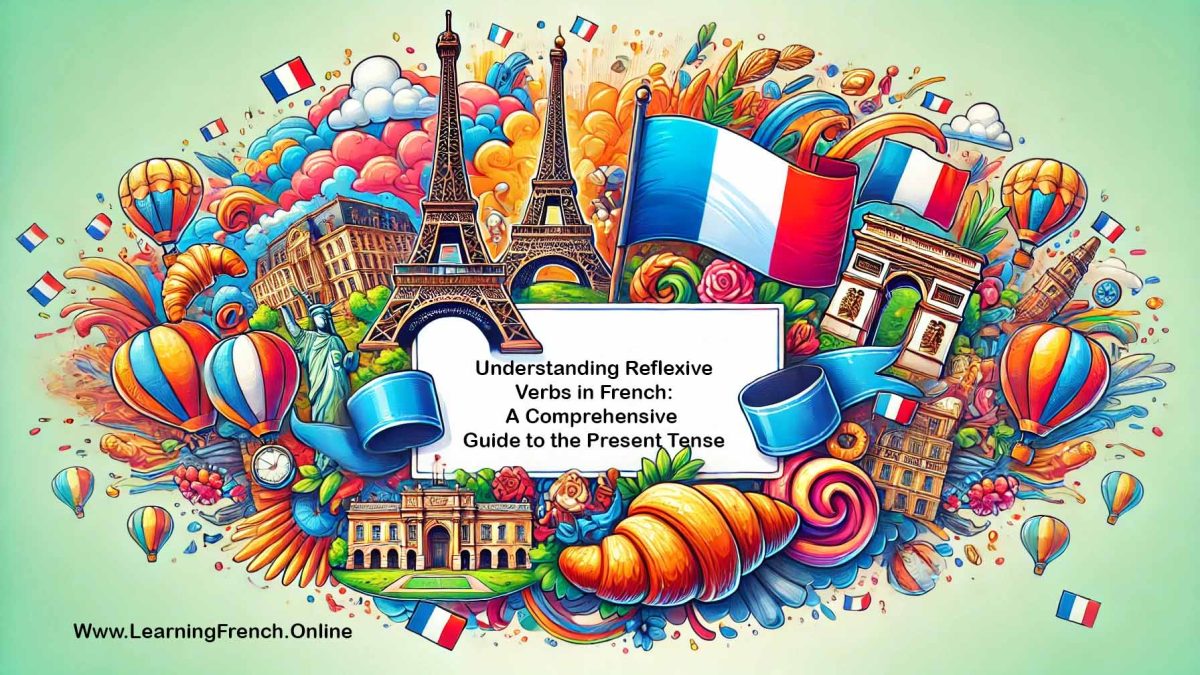
Understanding the Past Tense in French: A Comprehensive Guide to the Passé Composé
August 26, 2024
Understanding the Differences Between “Depuis,” “Pendant,” and “Pour” in French
August 26, 2024Understanding Reflexive Verbs in French: A Comprehensive Guide to the Present Tense
Reflexive verbs are an essential part of French grammar, and mastering them is crucial for any learner aiming to communicate effectively in everyday situations. At the A2 level, understanding how to use reflexive verbs in the present tense will allow you to describe daily routines, express actions that people do to themselves, and engage in more complex conversations. This comprehensive guide will explore the formation and usage of reflexive verbs in the present tense, provide numerous examples, and offer tips on how to avoid common mistakes.
What Are Reflexive Verbs?
Reflexive verbs in French Grammar are verbs that indicate that the subject of the verb is performing the action on itself. These verbs are paired with reflexive pronouns, which correspond to the subject of the verb. In English, reflexive verbs are often translated with phrases like “myself,” “yourself,” “ourselves,” etc., though the structure is not as explicit as in French Grammar .
Reflexive Pronouns
Before diving into the conjugation and usage of reflexive verbs, it’s important to understand the reflexive pronouns in French. These pronouns are placed before the verb and must agree with the subject.
| Subject Pronoun | Reflexive Pronoun | Example Verb (se laver – to wash oneself) |
|---|---|---|
| Je | me (m’) | Je me lave (I wash myself) |
| Tu | te (t’) | Tu te laves (You wash yourself) |
| Il/Elle/On | se (s’) | Il/Elle/On se lave (He/She/One washes) |
| Nous | nous | Nous nous lavons (We wash ourselves) |
| Vous | vous | Vous vous lavez (You wash yourselves) |
| Ils/Elles | se (s’) | Ils/Elles se lavent (They wash themselves) |
Conjugating Reflexive Verbs in the Present Tense
Reflexive verbs are conjugated in the present tense like regular verbs, but with the addition of the appropriate reflexive pronoun before the verb. The infinitive form of reflexive verbs always includes the pronoun “se” (e.g., se laver, se lever, se réveiller).
Example: Conjugating se lever (to get up)
- Je me lève (I get up)
- Tu te lèves (You get up)
- Il/Elle/On se lève (He/She/One gets up)
- Nous nous levons (We get up)
- Vous vous levez (You get up)
- Ils/Elles se lèvent (They get up)
Usage of Reflexive Verbs
Reflexive verbs are used in a variety of contexts in French. Below are the main uses:
1. Daily Routines
Many reflexive verbs describe actions that are part of daily routines. These include actions like getting up, brushing your teeth, getting dressed, and so on.
Examples:
- Se réveiller (to wake up): Je me réveille à 7 heures. (I wake up at 7 o’clock.)
- Se brosser les dents (to brush one’s teeth): Il se brosse les dents après chaque repas. (He brushes his teeth after every meal.)
- S’habiller (to get dressed): Elle s’habille avant de sortir. (She gets dressed before going out.)
2. Expressing Emotions
Reflexive verbs are also used to describe emotions or changes in state.
Examples:
- Se fâcher (to get angry): Tu te fâches trop facilement. (You get angry too easily.)
- S’inquiéter (to worry): Nous nous inquiétons pour toi. (We worry about you.)
- Se sentir (to feel): Je me sens fatigué aujourd’hui. (I feel tired today.)
3. Reciprocal Actions
When the action is performed by two or more people on each other, reflexive verbs are used in a reciprocal sense.
Examples:
- Se parler (to talk to each other): Ils se parlent souvent. (They talk to each other often.)
- Se rencontrer (to meet each other): Nous nous rencontrons à la gare. (We meet each other at the station.)
- S’aimer (to love each other): Ils s’aiment beaucoup. (They love each other a lot.)
Reflexive Verbs with Idiomatic Meanings
Some reflexive verbs have idiomatic meanings that differ from their non-reflexive forms. This means that when used reflexively, the verb can take on a different meaning.
Examples:
- S’en aller (to leave): Je m’en vais maintenant. (I’m leaving now.)
- Se rendre compte (to realize): Il se rend compte de son erreur. (He realizes his mistake.)
- Se souvenir de (to remember): Elle se souvient de toi. (She remembers you.)
Negative Form of Reflexive Verbs
To make a reflexive verb negative, place “ne” before the reflexive pronoun and “pas” after the verb.
Structure: Subject + ne + reflexive pronoun + verb + pas
Examples:
- Je ne me lève pas tôt le dimanche. (I don’t get up early on Sundays.)
- Ils ne se parlent pas souvent. (They don’t talk to each other often.)
- Elle ne s’inquiète pas pour ça. (She doesn’t worry about that.)
Questions with Reflexive Verbs
When forming questions with reflexive verbs, you can use either inversion or “est-ce que.”
Examples:
- Inversion: Te lèves-tu à 7 heures ? (Do you get up at 7 o’clock?)
- Est-ce que: Est-ce que tu te lèves à 7 heures ? (Do you get up at 7 o’clock?)
Common Mistakes and How to Avoid Them
- Forgetting the Reflexive Pronoun:
- Incorrect: Je lave à 6 heures. (I wash at 6 o’clock.)
- Correct: Je me lave à 6 heures. (I wash myself at 6 o’clock.)
- Misplacing the Reflexive Pronoun:
- Incorrect: Je lève me à 6 heures.
- Correct: Je me lève à 6 heures. (I get up at 6 o’clock.)
- Using the Wrong Reflexive Pronoun:
- Incorrect: Nous te lavons. (We wash you.)
- Correct: Nous nous lavons. (We wash ourselves.)
- Confusing Reflexive and Non-Reflexive Verbs:
- Some verbs have both reflexive and non-reflexive forms with different meanings.
- Example: Rappeler (to remind) vs. Se rappeler (to remember).
Practice Exercises
To reinforce your understanding of reflexive verbs in the present tense, try these practice exercises:
1. Fill in the blanks with the correct reflexive pronoun and verb form:
- Je _ (se lever) à 7 heures.
- Ils _ (se réveiller) tôt.
- Nous _ (se laver) les mains avant de manger.
- Tu _ (s’habiller) après la douche.
- Elle _ (se brosser) les cheveux. Answers:
- Je me lève à 7 heures.
- Ils se réveillent tôt.
- Nous nous lavons les mains avant de manger.
- Tu t’habilles après la douche.
- Elle se brosse les cheveux.
2. Convert the following sentences into negative form:
- Je me couche à 10 heures.
- Il se lève tôt le matin.
- Nous nous reposons après le déjeuner.
- Elles se maquillent avant de sortir.
- Vous vous souvenez de cette histoire. Answers:
- Je ne me couche pas à 10 heures.
- Il ne se lève pas tôt le matin.
- Nous ne nous reposons pas après le déjeuner.
- Elles ne se maquillent pas avant de sortir.
- Vous ne vous souvenez pas de cette histoire.
3. Translate the following sentences into French:
- They get dressed quickly.
- Do you (informal) brush your teeth every morning?
- She remembers the event.
- We don’t worry about the test.
- I wake up early on weekdays. Answers:
- Ils s’habillent rapidement.
- Est-ce que tu te brosses les dents chaque matin ?
- Elle se souvient de l’événement.
- Nous ne nous inquiétons pas pour le test.
- Je me réveille tôt en semaine.
Cultural Insights: Reflexive Verbs in French Daily Life
- Daily Routines: Reflexive verbs are often used to describe personal care routines, such as getting dressed, washing, or shaving. These activities are commonly discussed in French, particularly in the context of morning or evening routines.
- Expressions of Emotion: Reflexive verbs are frequently used to express emotions or changes in state. Understanding how to use these verbs allows you to describe how you or others feel in various situations, which is a key aspect of daily communication in French.
- Politeness and Formality: In formal situations, using reflexive verbs correctly can help you appear more polite and respectful. For example, using s’excuser (to apologize) appropriately shows good manners.
Conclusion
Mastering reflexive verbs in the present tense is a significant step forward for any French learner at the A2 level. These verbs are essential for describing daily routines, expressing emotions, and discussing reciprocal actions. By understanding their formation and usage, and practicing regularly, you can significantly improve your ability to communicate in French.
Remember, reflexive verbs are not just about grammar—they’re about expressing actions that are personal and reciprocal, which are fundamental aspects of everyday life. With consistent practice and attention to detail, you’ll find yourself using reflexive verbs naturally in your conversations. Bonne chance (good luck) on your journey to mastering reflexive verbs in French!

